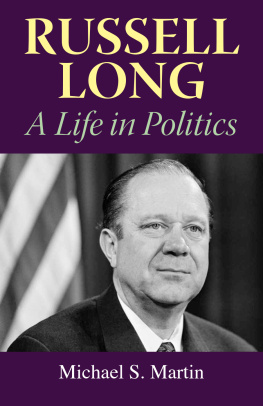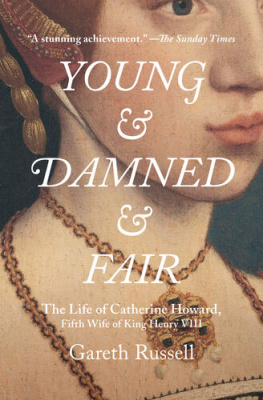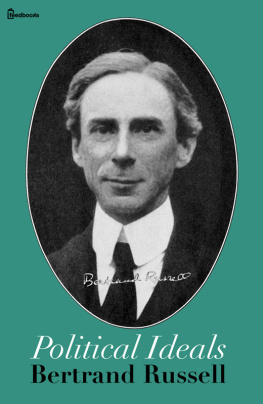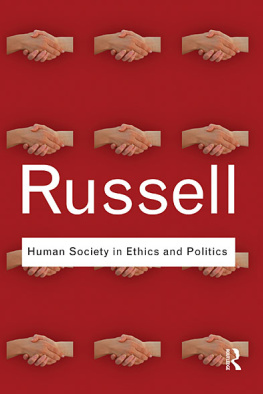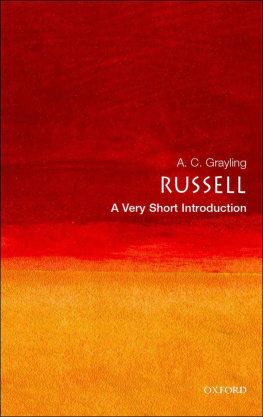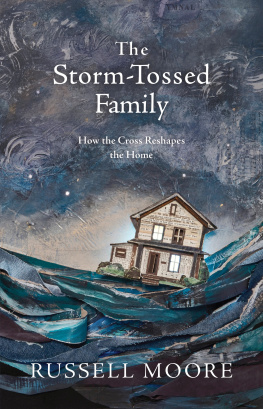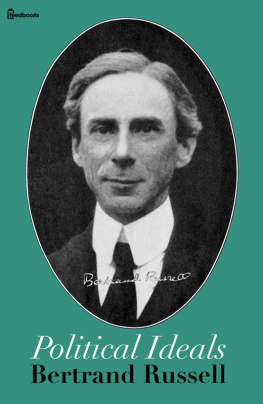www.upress.state.ms.us
The University Press of Mississippi
is a member of the Association of American University Presses.
Copyright 2014 by University Press of Mississippi
All rights reserved
Manufactured in the United States of America
First printing 2014
Library of Congress Cataloging-in-Publication Data
Martin, Michael S., 1972
Russell Long : a life in politics / Michael S. Martin.
pages cm
Includes bibliographical references and index.
ISBN 978-1-61703-974-4 (cloth : alk. paper) ISBN 978-1-61703-975-1 (ebook) 1. Long, Russell B. 2. LegislatorsUnited StatesBiography. 3. United States. Congress. SenateBiography. 4. United StatesPolitics and government19451989.
I. Title.
E748.L864M37 2014
328.73'092dc23
[B]
2013030502
British Library Cataloging-in-Publication Data available
For Amy, Sam, and Alexand Mom.
ACKNOWLEDGMENTS
This book started, as I suspect many do, in a conversation. While walking across the campus at the University of Arkansas on a spring day in 1998, I discussed the Long family of Louisiana with Dr. Randall Woods. As we walked, I lamented that just about everything that could be said about Huey and Earl Long had been said (a sentiment I do not necessarily agree with anymore), to which Woods responded, Yet not much has been done on Russell.
I immediately set about finding out what I could about Russell Long, Hueys son and Earls nephew, and what I discovered was that, indeed, not much had been written about him by historians. To be sure, a biography existedBob Manns Legacy to Power: Senator Russell Long of Louisianabut it was an authorized biography and had not been done by a professional historian. Aside from that, very little had been written about this man who had risen to the highest levels of our nations government in a political career that spanned four decades. And so from that conversation came the genesis for this book.
As the reader might suppose, my most heartfelt thanks go to Dr. Randall Woods, Distinguished Professor of History at the University of Arkansas. This book would not exist without him. To the rest of the faculty of the Department of History at the University of Arkansas during my time therein particular, David Chappell, James Chase, Willard Gatewood, Thomas Kennedy, Charles Robinson, David Sloan, Richard Sonn, Daniel Sutherland, Elliott West, Jeannie Whayne, and Patrick WilliamsI offer my gratitude for your willingness to challenge me, listen to me, and teach me.
As with any work of history, this book is constrained by its sources. Happily for me, the amount of information related to Longs career is extensive. Indeed, the sheer size of his collection of papers housed at Hill Memorial Library on the campus of Louisiana State University boggled my mind at times. Thus, I am particularly grateful to the staff at Hill Memorial, notably Emily Robison, Judy Bolton, and Tara Zachary Laver, who helped me sift through what at times seemed like mountains of files and folders during those days I spent in their beautiful reading room.
Their efforts impressed me all the more since I worked in a similar collection while a Research Associate with the Albert Gore Research Center of Middle Tennessee State University. I am indebted to Lisa Pruitt, director of the Gore Center at the time, for showing me the inner workings of such an archive and for serving as a sounding board. My work at the Gore Center focused on research for a biographical project on Albert Gore Sr., and it was through that project that I came to know and admire Anthony J. Badger, an eminent historian who worked closely with me and provided me with a model for clear thinking, rigorous research, and lucid writing. Tony helped me become the historian I am now, and for that I am forever grateful.
Over the years, many of my colleagues and friends have read over or commented on various portions of this book. Others have simply offered me words of advice and encouragement. Their insight, constructive comments, and support made this a better book. And so I send a hearty thanks to Thomas Aiello, Janet Allured, Vaughan Baker, David Barry, Carl Brasseaux, Richard Cusimano, John Kyle Day, Susan Dollar, Adam Fairclough, Kevin Fontenot, Julia Frederick, Joseph Andy Fry, Shannon Frystak, Edward Haas, Glen Jeansonne, Dolores Labb, Jeff Littlejohn, Kyle Longley, Andy Moore, Charles Pellegrin, and Amos Simpson.
Although working for the state of Louisiana in the early twenty-first century can amount to a roller-coaster ride of budget exigencies and fiscal cliffs, getting to spend my workdays with my colleagues in the University of Louisiana at Lafayettes Center for Louisiana Studies and Department of History, Geography, and Philosophy sure makes the ride fun. To the staff at the CenterMary Karnath-Duh, Linda Garber, Jennifer Ritter Guidry, Chris Segura, John Pudd Sharp, Melissa Teutsch, and James Wilsoneach of you make my job interesting and enlightening. Likewise, I always look forward to learning something new from Bob Carriker, Mary Farmer-Kaiser, Rich Frankel, Judith Gentry, Rob Hermann, Jordan Kellman, Susan Nicassio, Chad Parker, Tim Reilly, Carl Richard, Sara Ritchey, Chet Rzadkiewicz, and John Troutman. Each of you have inspired me in your own way. The friendships I have with Mary, Bob, Jordan, and their spouses strengthens me and reminds me that life is fuller when you can share its ups and downs with those you care about.
Finally, nothing I do would be worth the doing without my family. My mom and stepfather, Tommi and John Kent, and my dad and stepmother, Steve and Levy Martin, have given me more support and encouragement than any one person deserves. My sons, Sam and Alex, have inspired and distracted me in the very best possible ways. And my wife, Amy, has simply been the reason I do anything.
Russell Long
INTRODUCTION
WHEN RUSSELL LONG entered the United States Senate in 1948, World War II burned brightly in American memories, and the Cold War loomed ominously. The politics of civil rights and the civil rights movement were just beginning to make inroads in the nations public consciousness. In his home state, Louisiana, Longs uncle, Earl Long, had earlier in the year brought the so-called Longite political faction back to power. This book provides an investigation of Longs public life over the four decades that followed his swearing in to the Senate and places him within the context of Louisiana, southern, and national politics during the twentieth century.
As a member of Louisianas most famous and influential political family, and as the son of Huey Long, perhaps the most famous Louisianian of all time, Russell Longs political career was seemingly preordained. Remarkably, he extended the political power first forged by other members of his family and attained heights of true power unknown even to Huey and Earl. The Long family pervaded Louisiana politics from the late 1920s through the 1980s and attained a notoriety rivaled only by the Kennedys of Massachusetts. A Long, particularly the eldest son of Huey, simply could not be apolitical in Louisiana. Russells father and mother, aunts and uncles, cousins and in-laws all lived political lives, some of them very publicly and others privately. His fathers assassination, the single most significant event in Russells life, set the wheels in motion for his eventual political career. From that point on, the trajectory of Longs life pointed toward politics.

